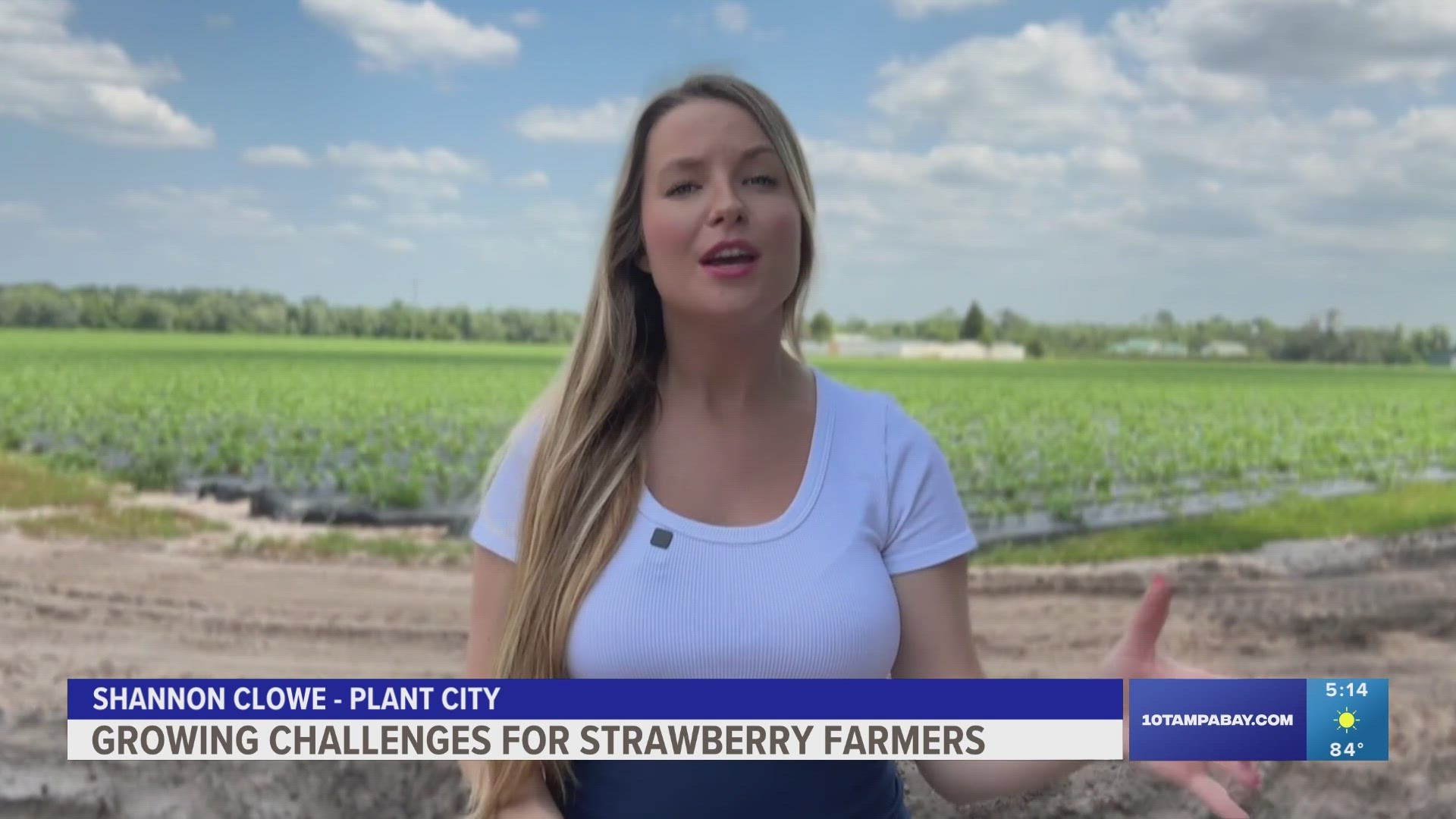PLANT CITY, Fla. — It's no secret: Plant City is known for some of the most amazing strawberries in the country.
Recent studies have questioned whether that will change in the future with a changing climate. Ongoing conversations are circulating about farmers being able to grow strawberries in Plant City in the years to come.
Some farmers expressed they are considering buying additional land outside of Plant City, but their decision isn't focused on climate – but on development.
Kristen Hitchcock, who serves as the Chief Financial Officer for Parkesdale Farms, explained there's an overload of people moving to Central Florida. They're finding people building homes on vacant land, which leaves farmers with less land to grow on. That means farmers will need to find land elsewhere.
"At some point, we’re going to have to find other land somewhere," Hitchcock stated.
Some farmers are selling their available land to people moving to the area.
"A lot of the farmers going South are selling their land here to people who are willing to build homes on the property," Hitchcock said.
She is also aware of people purchasing land North of Plant City. The issue with that would be a change in weather.
"Florida berries really do well in the winter months. It’s because that coolness that we do get isn’t too cold, but also not too warm," she said.
Hitchcock explains every growing season there are challenges farmers face. This season wasn't great because of weather impacts.
"If you don’t have the sun coming out, then you’re not going to have the berries coming up. All of that was down and the quantity was down," Hitchcock explained.
Rain plays a big role in the season's success. This year there were a number of storms that weren't ideal for growing strawberries. Due to the weather impacts, strawberry growers fund research to help them have better seasons.
Researchers at the University of Florida Institute of Food and Agricultural Sciences are funded by growers to help them come up with ways to better grow strawberries.
For example, some researchers concentrate on how to limit the spread of diseases.
"This system we developed to tell them when the conditions are conducive for disease," a UF/IFAS Professor of Plant Pathology, Natalia Peres said.
Peres explained they utilize a system that tracks certain diseases. This helps them determine when disease can be present in the area. The system measures the amount of rain and other elements and if there is enough, it alerts farmers to spray. This has been a cost-effective system for farmers because before this technology they would spray weekly as a precaution.
Now growers can spray when researchers believe certain diseases are present. This saves them money on materials and it's better for the environment as it limits the amount of chemicals used.
There are also strawberry breeders who work all year long to breed strawberries that will best survive the season. They are able to test how the strawberry will survive in different weather conditions.
"The possibility of precipitation is one of the things is probably the most important potential impact. Rain damages strawberry fruit," a UF/IFAS professor of Horticulture Sciences, Vance Whitaker said.
Florida strawberry season runs from November until the end of March. If there’s a lot of rain in between, it will hurt the season’s production.
"When we were having all of that rain and no sunshine, not only was the fruit not coming on well, but also, we’re having to go through the field and take a lot of the fruit off and just throw it on the ground because it’s all spoiled," Hitchcock said.
While some farmers are choosing to buy land elsewhere, farmers like Hitchcock are working with researchers to see how science can help them have a successful season. "I would say their technology has been a tremendous helped us," Hitchcock added.
Researchers believe the work they are doing will help keep strawberries growing in Plant City for years to come. "I think they’re looking to science-based solutions try not to try to help mitigate things that might result of climate change," Whitaker said.
Hitchcock doesn't feel the need to move Parkesdale Farms yet because of climate or development. She did add, moving at some point down the line is likely inevitable. She explains the farms have been in Plant City for years and dealt with challenges, yet they are still there.
That's why she is optimistic that no matter the challenge they face, strawberries will continue to grow in Plant City.
"We’re always going to look for the better way because we want to have this for years to come," Hitchcock said.

